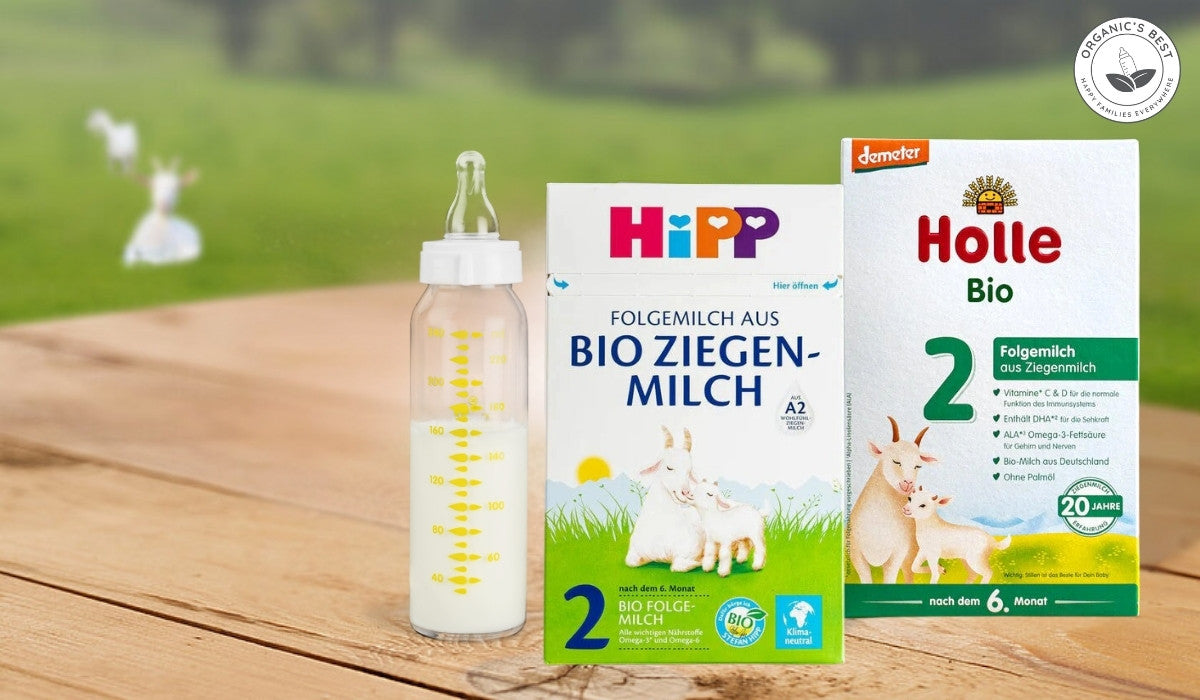Click to Get 2 FREE Boxes/Cans
Click to Get 2 FREE Boxes/Cans
Only New Customers! Click HERE to Get 2 Extra Boxes/Cans for Free With Your First Order.
Only New Customers! Click HERE to Get 2 Extra Boxes/Cans for Free With Your First Order.
BABY FORMULA
Offering new parents top-quality European infant formula from renowned brands like HiPP, Holle, Kendamil, and more. If you’re uncertain about which product to choose, our Formula Finder can help you make the best decision for your baby.
Baby Food
Offering new parents a premium selection of European baby foods, including jars, pouches, cereals, and snacks from esteemed brands like HiPP and Holle.
HiPP vs Holle Goat Milk Formula: The Comparison Guide
by Agustina Fernandez December 17, 2024 11 min read

Picking between HiPP and Holle formulas can feel like one of those impossible parenting decisions. Both formulas are packed with wholesome ingredients and carefully designed for little ones, but deciding which goat milk product is the one for your baby? That takes a bit of digging.
The truth is, it often comes down to the specifics: what works best for your baby's needs, your preferences when it comes to ingredients, and even how these formulas fit into your lifestyle. It's not about which brand is better- it's about which is better for you.
To help you decide, we've put together a complete guide comparing HiPP goat milk vs Holle goat milk.
Whether you're just starting your formula journey or still on the fence, this breakdown will give you the clarity you need to make an informed decision. Let's get into it!
Table of Contents
Organic Goat Formula: HiPP Goat Milk and Holle Goat Milk
Before diving into the details of Holle formula, and HiPP formula, let's start with the basics: why choose goat milk formula in the first place?
Did you know that goat milk is the most widely consumed milk in the world, enjoyed by nearly three-quarters of the global population? It is nutritious, delicious, and surprisingly easy to digest despite its rich, creamy consistency.
Goat farming also typically uses less land and water than cow farming, making it a more eco-friendly choice.
But we know the reason that you're really here-for your little one! Goat milk may be great for adults, but does it offer the same benefits for babies?
It absolutely does! Here's how goat milk formula can support your tiny tot:

-
Softer Milk Curds: Goat milk forms softer curds in your baby's stomach, which makes it much easier for tiny tummies to break down, especially for babies with sensitive digestion.
-
Easily Digestible Fats: Goat milk is rich in medium-chain fatty acids (MCFAs), which act like mini energy boosters for your little one. Unlike the long-chain fatty acids in cow's milk, MCFAs are gentler on developing digestive systems.
-
Soothes Tummy Troubles: If your baby struggles with bloating, gas, or reflux, goat milk's digestibility could be a game-changer.
However, a quick heads-up: goat milk formula isn't suitable for babies with a confirmed or suspected cow's milk protein allergy (CMPA).
While goat milk proteins are different from cow's milk, they're still similar enough to cause reactions in babies with CMPA.
It's also unsuitable for babies with lactose intolerance because lactose is a natural part of goat milk's composition.
If you like what you hear about goat milk benefits, it's time to consider what product to choose. If you're in the market for an organic goat milk formula, both Holle and HiPP are considered top-tier options.
Holle and HiPP goat milk formula ingredients are both designed to be as close to breast milk as possible, offering the kind of nourishment your baby needs. But what makes each of them stand out? Let's break it down.
HiPP Goat Formula Highlights: Variations & Stages
HiPP has been a trusted name in baby nutrition for over 100 years, so it's safe to say they've mastered the art of baby formulas.
With a wide range of options designed to meet various dietary needs, it's no surprise that HiPP organic goat milk formulas are among the best.
HiPP offers two versions of their goat milk formula: German and Dutch. While the core ingredients are largely the same, the packaging and stages vary slightly to align with each country's specific regulations.
Here's what you can expect from HiPP formula.

-
Gentle on the Tummy: HiPP's goat milk formula contains A2 proteins, which are easier for babies to digest compared to the more common A1 proteins found in cow's milk. This could be a game-changer for babies with sensitive stomachs, as it does not release inflammatory peptides during digestion.
-
Lactose-Based: HiPP uses lactose as the primary (and only) carbohydrate source in their goat milk formula, making it more similar to breast milk when compared to formulas that use starch or maltodextrin. This simple carbohydrate profile allows this formula to be extra mild and gentle, perfect for tiny tummies.
-
Added DHA and ARA: These essential omega-3 and omega-6 fatty acids play a key role in brain and eye development. Research shows that when combined, they help support healthy neurological growth and vision in infants.
-
Prebiotics for Gut Health: HiPP incorporates galactooligosaccharides (GOS) into their formula-a type of prebiotic naturally found in breast milk that promotes healthy gut flora. GOS is known for its gut-friendly benefits because a happy tummy often means a happier baby!

HiPP Goat German
The German variety of HiPP formula is packaged and manufactured in Germany, and is available in 400g boxes.
Each box makes roughly 102 fluid ounces of prepared formula, enough for about 20 five-ounce bottles.
It comes in two stages, each tailored to meet the nutritional needs of different developmental milestones. Let's take a look at these stages.
-
HiPP Goat Stage PRE (0-6 months): HiPP Goat Formula Stage PRE is a naturally mild, organic formula designed for babies from birth to 6 months as a complete source of nutrition. It can complement or supplement breastfeeding and is ideal for newborns with mild digestive sensitivities. Formulated with gentle A2 goat milk proteins and prebiotics, it helps support healthy digestion.
-
HiPP Goat Stage 2 (6-12 months): Ideal for babies transitioning to solids, HiPP Goat Formula Stage 2 meets the growing energy needs of your curious little one. It contains slightly higher levels of fats, proteins, and carbohydrates, along with essential nutrients like calcium, magnesium, vitamin C, and iron. Stage 2 also offers 50% more iron than Stage PRE, providing your baby with 1.0mg of iron per 100ml.
HiPP Goat Dutch
HiPP Goat Dutch is very similar to the German version of HiPP's goat milk formula, with only a few differences. Similar to the German version, this goat milk formula is available in two stages, each offered in 400g cans.
-
HiPP Goat Milk Stage 1 (0-6 months): HiPP goat milk formula Stage 1 is carefully crafted to mirror breast milk. It provides a perfect blend of vitamins, prebiotics, and beneficial fatty acids to give you peace of mind about your baby's early nutrition.
-
HiPP Goat Milk Stage 2 (6-12 months): As your baby begins to explore solids, HiPP goat milk formula Stage 2 is the ideal complement to their growing diet, whether you're continuing breastfeeding or introducing new foods. It offers the nutrients your little one needs to thrive, helping support their growth, energy, and overall development during this exciting transition.
Another primary distinction is that HiPP Dutch is manufactured in Germany but packaged in the Netherlands.
Despite the difference in packaging, HiPP is committed to sustainability, using minimal packaging and recyclable materials to increase the recyclability of their products wherever possible. In fact, HiPP reports that 97 percent of all waste can now be recycled.
That being said, HiPP's folding boxes (German) have a lower carbon footprint than their tin cans (Dutch). The graphics are printed with vegetable oil-based inks, free from mineral oils, and the cardboard used is Forest Stewardship Council® (FSC®)-certified, ensuring it's made from responsibly sourced wood fiber.
So regardless of whether you choose HiPP Dutch or HiPP German goat milk formula, you can feel good about supporting a company that is making huge strides in the sustainability department!
Holle Goat Formula Highlights: Variations & Stages
On the other hand, Holle is a pioneer in organic baby nutrition, renowned for its commitment to sustainability and quality. With Demeter certification on most products, Holle formulas are crafted following strict biodynamic farming methods, ensuring eco-consciousness and the highest nutritional standards.
Holle goat milk formula caters to sensitive stomachs while providing creamy, filling, and minimally processed nutrition.
Below, we delve into the specific variations of Holle Goat: Dutch, German, and Global.

Holle Goat Dutch
Looking for a goat milk formula that's convenient and uncompromising on quality? Holle Goat Dutch might just be your perfect match.
Packaged in durable 800g tin cans, Holle goat formula Dutch is easy to store and travel with, perfect for busy parents on the go.
Holle Goat Dutch offers Stages 1 to 3, each thoughtfully designed to meet your baby's changing nutritional needs.
-
Holle Goat Dutch Stage 1 has a gentle, lactose-only base, ideal for supporting your baby's delicate digestion in the early months.
-
Holle Goat Dutch Stage 2 and Holle Goat Dutch Stage 3 include small amounts of maltodextrin and starch to meet growing energy needs. Holle keeps it light-using only 25% of the starch allowed by European Food Safety Authority (EFSA) guidelines so your little one feels comfortably full without overloading their system.
Each stage of Holle Dutch goat milk formula contains DHA (docosahexaenoic acid), a key nutrient for brain and eye development. However, ARA (arachidonic acid) is only present in Holle goat milk formula Stage 1.
As for organic certifications, all Holle Goat Dutch formulas are EU and Demeter-certified organic.
Holle Goat German
For parents seeking more stage-specific options, Holle organic goat milk formula German delivers a wider range from Holle Goat PRE (suitable from birth) to Holle goat milk formula Stage 4 (suitable from 12 months), giving you more flexibility as your little one grows.
This version is packaged in sustainable 400g cardboard boxes, staying true to Germany's eco-friendly standards. Like the Dutch version, it's minimally processed to preserve the natural goodness of Holle goat milk ingredients.
Holle Goat Stage 1 and Stage PRE and 1 include both DHA and ARA, offering essential fatty acids for brain and eye development during the critical early months. Holle Goat Stage 2, Holle Goat Stage 3 and Stage 4 omit ARA and shift to a combination of maltodextrin and starch to meet increased energy demands, making it a great choice for older babies.
Finally, while all Stages are EU organic certified, Stage 4 doesn't have the additional Demeter certification.
Holle Goat Global
Holle Goat Global is the newest addition to the Holle lineup, and it's quickly winning hearts with its consistent inclusion of DHA and ARA in all stages, a standout feature among Holle formulas.
All stages are packed in 400g boxes and are lactose-only, adhering to European organic standards for clean, wholesome nutrition. This makes it a great option for parents who prefer to avoid maltodextrin and starch.
It comes in 3 stages, including a toddler formula that's perfect for toddlers transitioning to family meals; this stage provides all the nourishment they need to support their active, growing bodies.
While the Holle Global goat milk formula Stage 3 carries EU organic certification, it doesn't include the Demeter certification found in earlier stages, which are Holle Global goat milk formula Stage 2 and Holle Global goat milk formula Stage 1.
We know that was a lot to take in, so here's a quick summary to make things simpler:
-
Holle Goat Dutch: Packaged in 800g tins, available in Stage 1-3. Includes DHA in all stages and ARA in Stage 1. Stages 2 and 3 contain starch and maltodextrin for added energy support. All Stages are EU and Demeter organic.
-
Holle Goat German: Comes in 400g boxes with a wider range of Stages PRE-4. Stages PRE and 1 are exclusively lactose-based, and stages PRE and 1 include DHA and ARA. Stages PRE-3 are EU and Demeter organic but Stage 4 is only EU organic.
-
Holle Goat Global: Packed in 400g boxes, Holle Global features DHA and ARA in all stages and is entirely lactose-based. Stages 1 and 2 are EU and Demeter organic, but Stage 3 is only EU organic.
There you have it, everything you need to know at a glance! No matter the variation you choose, Holle's goat milk formulas offer premium, nutritionally balanced options designed to meet your baby's needs at every stage.
Holle Dutch vs. German: Which Organic Goat Milk Formula is Best?
If you've come this far and are learning towards Holle, you may be conflicted about choosing between their Dutch, German, or Global line.
The good news is that no matter which line you choose, the European Commission's Food Safety Authority has very strict standards for infant nutrition products.
This means that with Holle, you can be certain that your baby is getting the absolute best quality nutrition, not to mention the creamy and delicious taste you get with all of these products.
The main differences between the German and Dutch Holle formulas are more related to the packaging and labeling than the formula recipe itself. Holle Goat Dutch is offered in 800g tin cans, while the German version is offered in 400g cardboard boxes.
Additionally, the German Holle goat formula range is offered in Stages PRE to 4, which is more stages than the Dutch and Global goat milk versions, which both come in Stages 1 to 3.
Similarities & Differences Between Holle Goat and HiPP Goat Formula
Holle and HiPP are recognized for their exceptional organic goat milk formulas but cater to slightly different preferences and needs.
Here's a deeper look into their similarities and key differences:

Similarities
-
Organic Standards: Both brands adhere to rigorous organic farming standards, ensuring their formulas are free from synthetic pesticides, herbicides, and GMOs.
-
Gentle on Digestion: HiPP and Holle formulas are specifically designed to be gentle on babies' stomachs, making them excellent choices for little ones with sensitive tummies.
-
Nutrient-Rich: Both offer a comprehensive nutritional profile to support healthy growth and development.
Key Differences
-
Certification
-
Holle: Holle goat milk stands out with its Demeter certification, which exceeds EU Organic standards. This certification emphasizes biodynamic farming practices, ensuring the highest level of sustainability and quality.
-
HiPP: HiPP formulas are EU Organic-certified and meet strict organic guidelines, though they don't carry the biodynamic Demeter certification. However, they also hold the HiPP organic seal, which has certain regulations that surpass EU organic standards.
-
-
Stages Offered
-
Holle: Holle goat milk provides more stage options, particularly in their German line. These stages are carefully tailored to the specific nutritional needs of different developmental phases.
-
HiPP: HiPP offers fewer stage variations but maintains a consistent, high-quality formulation across their products.
-
-
Carbohydrate Source
-
HiPP: HiPP goat milk formulas are exclusively lactose-based, making them ideal for babies with extra-sensitive digestive systems.
-
Holle: Holle incorporates complementary carbohydrates (maltodextrin and starch) alongside lactose, providing an additional energy source that may benefit active or hungrier babies.
-
-
Packaging Sizes
-
Holle: Holle Goat Dutch comes in larger 800g tins, which can be more economical for parents who rely primarily on formula.
-
HiPP: HiPP goat milk formulas are packaged in smaller 400g containers for both their German and Dutch lines. These are convenient for travel or parents who alternate between formula and breastfeeding.
-
Final Thoughts on HiPP Goat vs. Holle Goat: Which One to Choose?
Simply put, goat milk formula is just as nutritious and wholesome as cow milk formula, but it may suit sensitive tummies even better.
So, if you're looking for a gentle formula for your little one or one that closely resembles breast milk, a goat's milk formula might be worth a try!
Remember that goat milk and cow milk share enough similarities that babies who have a cow's milk allergy may also have an allergic reaction to goat's milk, which is unsuitable for babies with lactose intolerance. Therefore, we recommend consulting with a healthcare professional before making any changes to your baby's diet, and always consult your pediatrician if your child has known or suspected CMPA or lactose intolerance.
Ultimately, the decision comes down to your baby's needs and personal preferences. Both formulas are excellent choices for parents seeking a gentle, organic option for their baby.
Just remember: it's not about picking the "better" formula; it's about picking the formula that works best for your family. Because let's face it, being a parent means making choices with love, even if it sometimes feels like you're picking between a rock and a hard place (or, in this case, between a goat and a goat).
|
Disclaimer: Please be aware that this information is based on general trends in babies, and it is not medical advice. Your doctor should be your first source of information and advice when considering any changes to your child’s formula and when choosing your child’s formula. Always consult your pediatrician before making any decisions about your child’s diet or if you notice any changes in your child. Breastfeeding is the best nutrition for your baby because breast milk provides your child with all the essential nutrients they need for growth and development. Please consult your pediatrician if your child requires supplemental feeding. |
Agustina Fernandez
Dr. Agustina Fernandez earned her medical degree from the prestigious Universidad Nacional de Córdoba, Argentina. With a deep-rooted passion for pediatrics, Dr. Fernandez is currently on the path to specializing in children's healthcare. Recently, she has delved into the vital field of infant nutrition. Her research interests include breastfeeding, infant formula, and baby food in little ones’ formative years. Dr. Fernandez's commitment to this area of study underscores her dedication to ensuring the health and well-being of children from their earliest days.
Leave a comment
Comments will be approved before showing up.
Also in Organic Infant Nutrition and Health Blog

10 Winter Activities for Kids and Toddlers
by Agustina Fernandez January 06, 2026 8 min read
Read More
How to Choose The Best Infant Formula: A Guide to EU Organic Formulas
by Agustina Fernandez January 05, 2026 14 min read
Read More
Best Formula for Breastfed Babies 2026 Guide
by Agustina Fernandez January 05, 2026 15 min read
Read More
Reviewed by Dr. Bardha Citaku, MD
-

Dr. Bardha Citaku: Medical Reviewer of Organic's Best Blog
Dr. Bardha Citaku completed her medical studies at the University of Prishtina in Kosovo, where she began her journey into the field of medicine. She has since developed a career in medical research, contributing to projects with notable organizations, including the World Health Organization (WHO).
